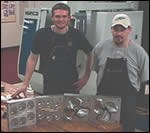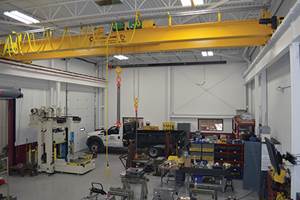Ferris State University: A Well-Rounded Moldmaking Education
Combining book learning with hands-on lab time, FSU graduates' job placement is nearly 100 percent.
For the past 48 years, the Manufacturing Tooling Technology program at Ferris State University (Big Rapids, MI) has been educating its students on precision machining and tooling processes through a combination of book learning and nearly 1,000 hours of lab time for hands-on training—for which they can earn an AAS (associate's) degree. Graduates who decide to continue their education can stay at Ferris and, within two additional years, earn a bachelor's degree in one of many related programs.
According to Professor Dennis Finney, students obtain a solid technical foundation through the direct application of precision machining and tooling processes. "Students learn to apply relative mathematical calculations; interpret engineering drawings and CAD data; utilize precision metrology equipment; plan machining processes; specify tooling and equipment requirements; utilize machining equipment—including manual and CNC equipment; and apply metallurgical processes," he explains. "Two CNC classes take students through 2-D manual G-code programming; 2-D and 3-D conversational programming; and complex 3-D CAD/CAM programming." Additionally, course projects focus on processing and problem solving and take students through the costing, designing, building, and production running of jigs and fixtures, metal stamping dies, and plastic molds.
The courses are conducted in a 16,000-square foot facility. Amongst the equipment are 20 vertical mills, six CNC mills and 15 lathes. According to Finney, the program's equipment is a combination of owned, donated and consigned pieces (see Giving Companies Sidebar, page 54).
Specialized Curriculum
"The Manufacturing Tooling Technology program is unique in that it is the only tooling- focused program in Michigan and one of very few in the U.S.," Finney explains. "This program incorporates an applied technology approach to educating its students and since its origin in 1956; it has developed a reputation as a national leader in the precision machining and tooling industries." (See Course Requirements Sidebar, page 55). Since its students gain a solid foundation in machining and tooling, options abound for program graduates—including moldmaker, machinist, tool and die maker, CNC programmer, etc.
Finney adds that with additional experience and/or education, graduates can move into occupations such as tooling engineer, process engineer, manufacturing engineer, project engineer, as well as management level positions. A survey conducted by the school in 2002 showed that the average starting salary for MFGT graduates was $34,725.00/yr. In 2004, the Bureau of Labor and Statistics indicates (from the 2002 survey) that FSU Manufacturing Tooling Technology graduates starting wages fall within the top 10 percent on a national scale. Furthermore, Finney reports that job placement for graduates consistently rates at the 99 to 100 percent level.
To help students find employment, FSU has a Student Employment and Career Services Department. During the first year of the program, companies look to hire students for the summer. "The students come back in the fall for the second year and if the company liked the work ethic and ability during the summer, they bid high enough to get the student upon graduation," Finney explains.
FSU Report Card
Brett Hopkins, Senior Applications Engineer for Auburn Hills, MI-based Makino Die/Mold Technologies—a provider of advanced machining technologies—recently hired a graduate of FSU's Manufacturing Tooling Technology program. "In a former career, I was responsible for facility operations of a manufacturing training program and know the challenges that operating such a facility presents," Hopkins states. "I consider Ferris State to be in an elite class of manufacturing training facilities in the diversity of equipment they have and the dedication of their staff. They have a well-developed plan for transferring current industry technology to the students. They provide a very logical and thorough coverage of all aspects of the manufacturing of tooling—and yet still manage to provide an environment where the students can challenge the conventional wisdom of the industry and experiment with ways of improving the process. With the demise of so many apprentice programs in our industry, Ferris State stands as a badly needed resource in training a new generation of skilled workforce.
"The industry has a high regard for the quality of graduate coming from this program," Hopkins continues. "This is why I contacted Ferris State to see what they might have to offer. They put me in contact with past graduates who fit my needs. We recently hired Keith Roeser, a 1998 graduate of the program. Keith had worked in the tooling field since graduating and has built up a very solid understanding of the industry. I believe that the training he received through Ferris State provided a very solid, broad-based understanding that has allowed him to progress his knowledge and capabilities within the industry much faster than would otherwise be the case. He continues to grow with his experiences here at Makino and has impressed all of us with his skills and work ethic."
Roeser has been an applications engineer for Makino since last July. He feels FSU's program adequately prepared him to work in the industry. "I took four years of machine shop in high school, so the first year was a little bit of a review, but the second year when we made a mold the first semester and a die the second semester, I started learning some new things," he notes. "The professors really care about what they are teaching and truly have a passion for moldmaking." This spring, Roeser plans to give back to the school that taught him so well by speaking to students about high-speed machining. "It will really help the students to get information from someone who is working with the equipment every day," Roeser states.
Andy Beach, a machinist at Commercial Tool & Die (CTD, Comstock Park, MI)—a manufacturer of plastic injection and die cast molds for the automotive, toy, appliance and hardware industries—is on the same page as Roeser. He also entered FSU's program with a bit of experience, but left with a well-rounded moldmaking background. "In my final three semesters at Ferris, I was introduced to all different aspects of the moldmaking industry," he recalls, "like plastic injection molding, stamping dies, CNC, EDM, fixtures and more. FSU gave me the basic CNC and mold building experience to start my learning curve at an accelerated rate at Commercial."
Beach's supervisor Fred Longcore—CNC machining foreman at Commercial Tool—is very satisfied with Beach's performance. "Four years ago I was faced with the problem of finding machinists that were able to compete at such an elevated technical level as is offered here at Commercial Tool Group," Longcore states. "I had always been aware of FSU's Tooling Technology program, but was unaware of what its curriculum consisted of." He contacted Finney, and after several conversations and a visit to the college, met Beach. "Andy was exactly what I was looking for—the perfect mixture of mechanical common sense and acquired academic knowledge gained by attending FSU. The only thing he was missing was a technical juggernaut, which is what I offered. He started working at CTD after graduation. With the knowledge learned from FSU, Andy proceeded to machine his way past the veteran journeymen previously employed by Commercial, and into a spot running our most advanced high-speed FPT milling machine at that time—an FPT Pragma with 3+2 machining capacity, 24,000 rpm and four-meter rapid feedrates. He did—and is currently doing—an awesome job."
Longcore then decided to make hiring at least one student from FSU part of his yearly regime, and has not yet been disappointed. To date, he has hired five students from the program. "Given the correct student with an eager mindset, the program at FSU is one of the best around for giving students the first stepping stone into the manufacturing world," Longcore states.
Faculty Gets Involved
There are currently five full-time, tenured faculty members working in the Manufacturing Tooling Technology program, who all hold MS degrees. According to Finney, faculty members participate in a wide variety of professional and scholarly activities—including related research, developing and presenting specialty training seminars and workshops, and outside consulting services.
The program is reviewed on an annual basis by the faculty, alumni and the school's advisory board to ensure industrial relevance. "Our advisory board tells us when it is time to change," Finney notes. "For example, they told us not to not teach cutting gears on the horizontal mill any more, they recommended we use the wire feed EDM because we can program it in seconds and cut it unattended with wire feed EDM with a high degree of accuracy." With the assistance of their advisory board, the Manufacturing Tooling Technology program also has been making gradual curriculum changes consistent with industry standards—like using magnetic chucks to hold cavity and core plates or palletize so setups take seconds instead of minutes.
"In 2002, we conducted a nationwide analysis of occupations related to manufacturing tooling technology," Finney explains. "This analysis was used to develop a matrix for evaluating the program curriculum. Currently, our faculty is comparing the curriculum to this matrix in order to validate the curriculum. It is expected that this will prove very useful and be repeated on a five-year cycle."
For the remainder of 2005, Finney plans on the students continuing to learn and use new technologies in mold building (e.g. Delcam and Mastercam software), high-speed machining and better processing techniques. In 2006, Finney plans to go on sabbatical—after finding a journeyman moldmaker to temporarily take his place—to observe high-speed machining and other new moldmaking processes in action at mold shops, then taking his newfound knowledge back to the students. "I think the best part of our program is the many hours of hands-on training when the equipment is running in the lab," Finney stresses, "and my travels will help this process continue to evolve."
Related Content
How to Improve Your Current Efficiency Rate
An alternative approach to taking on more EDM-intensive work when technology and personnel investment is not an option.
Read MoreThe Role of Social Media in Manufacturing
Charles Daniels CFO of Wepco Plastics shares insights on the role of social media in manufacturing, how to improve the “business” side of a small mold shop and continually developing culture.
Read MoreEditorial Guidelines: Editorial Advisory Board
The Editorial Advisory Board of MoldMaking Technology is made up of authorities with expertise within their respective business, industry, technology and profession. Their role is to advise on timely issues, trends, advances in the field, offer editorial thought and direction, review and comment on specific articles and generally act as a sounding board and a conscience for the publication.
Read MoreThe Trifecta of Competitive Toolmaking
Process, technology and people form the foundations of the business philosophy in place at Eifel Mold & Engineering.
Read MoreRead Next
The Ivar Ted Quarnstrom Foundation: School's In
Dedicated to furthering the educational endeavors of moldmakers, ITQ gets an A for effort when it comes to fundraising.
Read MoreReasons to Use Fiber Lasers for Mold Cleaning
Fiber lasers offer a simplicity, speed, control and portability, minimizing mold cleaning risks.
Read MoreAre You a Moldmaker Considering 3D Printing? Consider the 3D Printing Workshop at NPE2024
Presentations will cover 3D printing for mold tooling, material innovation, product development, bridge production and full-scale, high-volume additive manufacturing.
Read More























